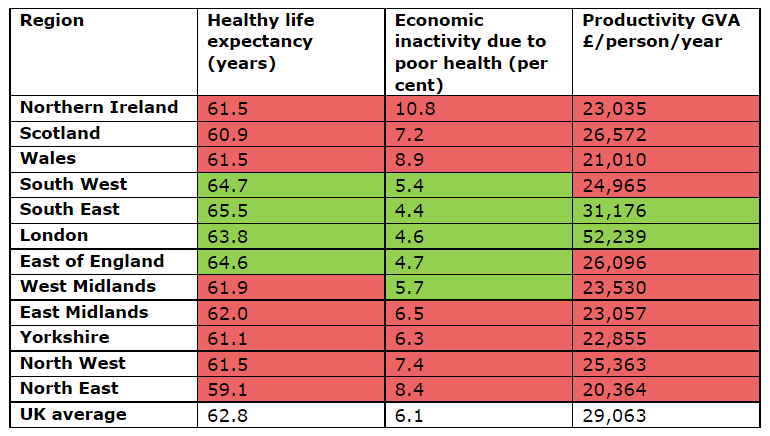Revealed: the health inequalities holding back growth in key areas of the UK
5 Dec 2022Press Story
Ill health undermining levelling up as workers in North East twice as likely to be forced out of labour market by sickness as people in South East
Regional inequality is being exacerbated by high levels of illness - reducing levels of productivity and the number of people available for work - according to a new report by IPPR.
The government's levelling up agenda is being critically undermined as new data shows sickness is twice as likely to force people out of work in the north east of England, Wales and Northern Ireland as in London and the South East.
There are now 2.5 million working-age people economically inactive because of their health – the highest level since records began.
Across the UK, on average, 6.1 per cent of the working age population are economically inactive because of poor health. However, in the North East, North West, Yorkshire, East Midlands, Wales, Scotland and Northern Ireland that figure is significantly higher. All these areas also have lower than average life expectancy and lower than average productivity per person.

The report also finds that Covid-19 has made this regional inequality worse, as Wales, Scotland and every region in the north of England and the Midlands have higher long-Covid incidences than the UK average.
The findings form part of an IPPR commission on health and prosperity report, coming out later this week.
Chris Thomas, head of the Commission on Health and Prosperity at IPPR, said:
“The evidence is ever clearer: a fairer country is a healthier country, and a healthier country is a more prosperous country. Yet, we are getting sicker and poorer as a country – with deepening health inequalities undermining national prosperity, particularly in the North and the devolved nations.
“If the government truly wants to level up the country, it needs to do far more to make better health a keystone of the UK’s economic recovery. Better health is the best and clearest route to better lives, fairer economics, and greater prosperity for us all.”
Jordan Cummins, health director at the CBI, and a member of IPPR’s Commission on Health and Prosperity said:
“Businesses across the country care deeply about the health and resilience of the workforce and need this to be a priority for government. The consequence of millions being lost from the labour market has a real human cost, but also presents a drag on economic growth.
"Government intervention, in partnership with industry, will be crucial. Policymakers need to prioritise prevention, reducing harm once people are sick, investing in innovative treatments, and partnering with businesses to accelerate progress and create healthier workplaces more inclusive employment opportunities."
Clare Bambra, professor of public health at Newcastle University and also a member of the IPPR commission said:
“The North has huge economic potential. But time and time again, research has shown that government's failure to tackle health inequalities are setting it back. If ministers want to level-up the country, deliver better lives for all people, and ensure a productive economy, then they must tackle health inequalities in the North of England and beyond.”
ENDS
Chris Thomas, the report’s author, is available for interview
CONTACT
David Wastell, Director of News and Communications: 07921 403651 d.wastell@ippr.org
Liam Evans, Senior Digital and Media Officer: 07419 365334 l.evans@ippr.org
NOTES TO EDITORS
The IPPR paper, Getting better? Health and the UK Labour Market by Chris Thomas will be published at 00:01 on Wednesday 7 December 2022
All data is latest. Productivity figures are 2020, healthy life expectancy is 2020, economic inactivity due to health is Q2 2022
The Commission on Health and Prosperity is a landmark initiative, exploring the case that a fairer country is a healthier country, and that a healthier country is a more prosperous country. Its 21 commissioners are leading figures from academia, civil society, trade unions, life science, politics and business.
IPPR is the UK’s pre-eminent progressive think tank. With more than 40 staff in offices in London, Manchester, Newcastle and Edinburgh, IPPR is Britain’s only national think tank with a truly national presence. www.ippr.org